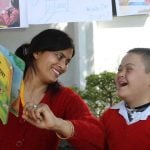
The Foundation’s Wabi-Sabi inclusion program carried out workshops on ‘Classroom and Behavior Management’ for 25 teachers at Summerhill School and Himalayan Academy recently.
In line with our efforts to promote neurodiversity in the classroom, the workshops focused on social and emotional curriculum, sense of community, positive language, interactive modelling and logical consequences. The teachers discussed their concerns about the behavioral issues that many children with disabilities and academic challenges exhibit. Our team made suggestions on how they could address these and invited them to visit the Foundation to see our work with children.
As a signatory to the 2030 Agenda for Sustainable Development, India is committed to establishing and implementing an inclusive education system that prohibits discriminating against disabled students, and ensures that learning environments are accessible. Yet, 75% of India’s disabled children are out of school. Of those who do attend school, many are denied the support their learning requirements demand or are provided lower quality education in segregated environments. Parental and teachers’ attitudes towards disabled children are instrumental in enabling or hindering the goal of inclusive education, depending on whether they’re encouraging or biased.
LRF Wabi-Sabi facilitates the admission of disabled children into mainstream schools by working with disabled children and their parents, school principals, teachers, abled students and their parents so that disabled children feel welcome and able to cope academically and socially in their new environment. The program’s name is inspired by the Japanese perspective that views what might at first appear imperfect as beautiful in a unique way, and worthy of appreciation.
The beauty of inclusion is that it benefits not just visibly disabled children, but everyone. Many children labelled ‘weak’, lazy or distracted have undiagnosed learning disabilities. When teachers use inclusive teaching practices, these children benefit too, and learning becomes more enjoyable for neurotypical children as well. In an inclusive environment, everyone’s a winner!
If you’re a school principal or administrator interested in learning how your school can join the movement, please mail rupa@latikaroy.org with the subject line ‘Inclusion at (insert name of your school). We’re here to help!



It’s heartening to see initiatives like the Foundation’s Wabi-Sabi inclusion program actively promoting neurodiversity in educational settings. The workshops conducted on ‘Classroom and Behavior Management’ for teachers at Summerhill School and Himalayan Academy showcase a commitment to creating inclusive and supportive learning environments. Implementing strategies like focusing on social and emotional curriculum, fostering a sense of community, using positive language, interactive modeling, and logical consequences can significantly contribute to nurturing an inclusive educational space. Kudos to such efforts that contribute to making Schools in Horamavuspaces where every student feels valued and supported.